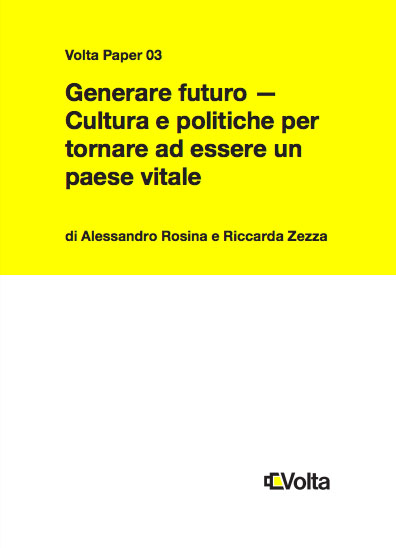
TOPIC | BIRTH RATE
RELEASE DATE | 15 MAY 2016
For Volta, Alessandro Rosina and Riccarda Zezza published a paper that suggests inovative proposals to address Italy’s demographic challenges.
A positive birth rate is about responsibility, but it is also about building something that will continue to exist one we are gone, something that can replace us, that will grow and expand beyond the realms of our imagination. It is the power we are born with to ensure that the world will continue when we are no longer around to see it.
Why have Italians stopped having children? Where has that desire for the future gone? And how can we bring it back?
In the e-book “Generating the future – Culture and policies to restore a positive birth rate”, Alessandro Rosina and Riccarda Zezza leave the beaten path to provide us with some new answers to these old questions. They offer solutions that are both highly innovative and sustainable to promote the positive choices that are involved in raising a family and investing in the future.
The authors:
Alessandro Rosina is a professor of Demographics and Statistics at the Economics Faculty of the Cattolica University of Milan, where he is in charge of the “Department of the Science of Statistics” and of the “Center for Applied Statistics in Business and Economics”. He coordinates the G. Toniolo Institute’s “Youth Report”. He has functioned as expert in a variety of Istat and ministerial commissions. His most recent books include: “Non è un paese per giovani”, (with E. Ambrosi; Marsilio, 2009), “Famiglie sole. Sopravvivere con un welfare inefficiente“ (with D. Del Boca; Il Mulino 2011), “L’Italia che non cresce. Gli alibi di un paese immobile” (Laterza, 2013), “Demografia” (with A. De Rose; Egea, 2015).
Riccarda Zezza worked as a manager, for fifteen years, for large companies in Italy and abroad. In 2012 she left her life as an executive in order to found her own company “Piano C” (Plan C), the first coworking space in Italy with an area for kids, which was soon to become a social laboratory for new models of the way the women’s sector relates to the field of work, revolutionising both. In 2013, together with Andrea Vitullo, she launched the educational project “maam – maternity as a master”, that became a book in 2014 and is today a course adopted by companies throughout Italy.
